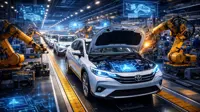Bosch to focus on connected devices to boost growth
23 Jan 2014
German conglomerate Robert Bosch said on Wednesday it would shift its strategic focus to developing technologies and components for connected devices to serve the growing ranks of the aged and non-working population, especially in the West.
The Bosch Group reported a 2.7 per cent increase in 2013 sales to €46.4 billion, despite the difficult economic environment (adjusted previous-year figure: €45.2 billion).
Leaving aside the extraordinary burdens caused by photovoltaics, the Bosch Group said, its earnings before interest and tax (EBIT) margin stood at 6 per cent, according to preliminary figures.
This is roughly one percentage point more than in the previous year. Including the extraordinary burdens as a result of photovoltaics, which are likely to total €1.3 billion, EBIT margin is around 3 per cent, which leaves a net profit of €1.3 billion.
Earnings have developed fundamentally better, but are once again affected by the situation of the solar energy division, which remained difficult in 2013. In early 2013, the company announced its decision to exit its activities in crystalline photovoltaics.
The company now wants to unlock existing potential for growth and open up new market segments.
Bosh said, apart from energy efficiency and connectivity, the company is also working intensively on the mobility of the future, which include electric, automated, and connected technologies and devices.
In 2013, Bosch launched many products and services related to these trends. They include highly efficient gasoline and diesel injection systems, driver assistance systems such as motorcycle stability control, mySPIN smartphone integration solution, telematics services for the management of vehicle fleets, and robotics applications such as the ''Indego'' lawnmower.
Bosh sees a ready a potential market in the high-spending aging population in the industrialised countries and the rapidly growing middle class in the emerging markets of Asia and South America.
"Connectivity will open up new possibilities for all our areas of work.
This goes for mobility, for industrial technology, and especially for energy and building technology - also in connection with our consumer goods," Volkmar Denner, chairman of the board of management said in a statement released on the day it unveiled full-year results.
"Bosch's strategic objective is to create solutions for a connected world," Denner said.
Bosch wants to push sensor technologies to help connect devices to broader Web-based systems. In energy and building technology for example, Bosch sees potential in the creation of "smart homes" where sensors activate geothermal or solar heating systems, depending on the weather conditions.
Bosch, a major automotive supplier, said it sees similar opportunities in the traffic, transportation and logistics fields.
By 2015, some 75 per cent of the global population will be online with more than 6 billion devices, Bosch said. Going forward, the company will make all its electronic appliances web-enabled, a way to get components to communicate.
To tap into this trend, Bosch has created the new unit Bosch Connected Devices and Solutions GmbH to explore new business opportunities centred around intelligent and web-enabled devices and objects.
Bosch Connected Devices and Solutions GmbH is headquartered in Reutlingen, where the electronics competence centre is based. The company was originally an innovation cluster.
Bosch uses these cross-divisional clusters to develop new business ideas for a connected world. There are further clusters related to connected buildings, connected mobility, and connected energy.
For example, Bosch will be working with partner companies to make a software platform available for standardised data exchange in smart homes.
''Alliances are key drivers of the trend toward connectivity,'' Denner said. Since November 2013, Bosch has been testing technologies that will allow the digital networking of an entire city in the ''Monaco 3.0'' pilot project. ''Our broad footprint and technological expertise, combined with the creativity and motivation of our associates, are absolutely essential for innovation and growth,'' Denner said.
Apart from exploiting new market opportunities for connected living, Bosch said it would continue to make use of every opportunity that presents itself for its traditional business.
Unlisted Bosch Group is set to unveil full-year earnings on April 30.
The Stuttgart-based company said it expects sales and profits to grow in 2014. Bosch said its automotive business continued to grow, particularly gasoline and diesel direct injection systems, as well as display instruments and infotainment systems.
In industrial technology, the packaging machinery business recorded good growth. By contrast, the global weakness of the mechanical engineering sector caused a considerable slump in the drive and control technology division.
In consumer goods, Bosch was once again successful with power tools in 2013, both for professional and DIY users.
Developments in the energy and building technology business sector were overshadowed by the situation in the solar energy division, which was again difficult in 2013, Bosch said.



















